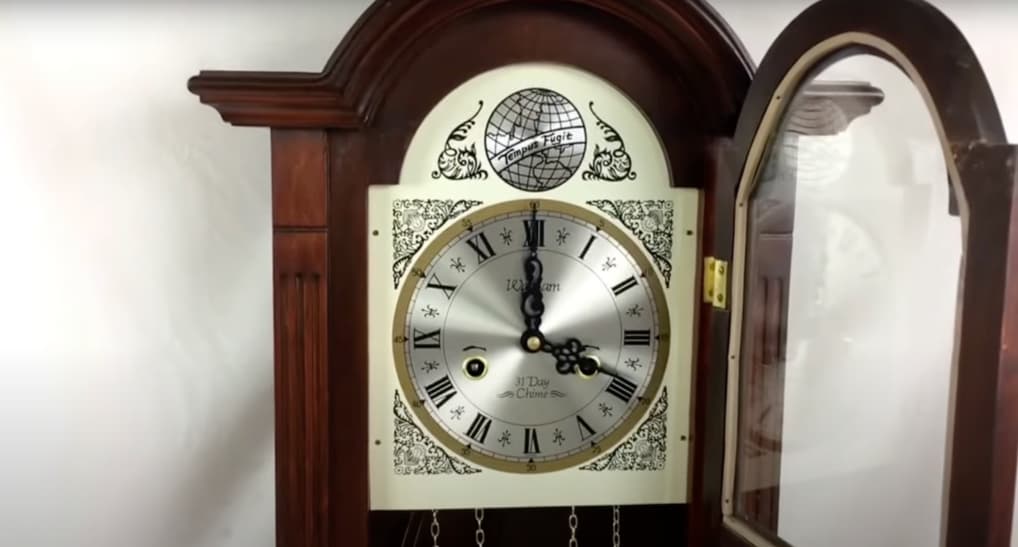The phrase “Tempus Fugit” translates to “Time Flies.” Grandfather clocks adorned with this phrase aren’t just time-keeping devices but symbols of heritage and craftsmanship. Let’s delve into their mesmerizing history and design.
The Origin of the Grandfather Clock
Before Tempus Fugit became synonymous with these towering timepieces, grandfather clocks had a tale of their own. Originating from Europe, their history intertwines with innovation and art.
Europe’s Clockmaking Tradition
In the heart of Europe, clockmaking wasn’t just a profession; it was an art. The intricate designs, attention to detail, and the elegance of these timepieces became a cherished heirloom for families.
Why “Grandfather” Clock?
Ever wondered why it’s called a “grandfather” clock? The tale dates back to the 1870s. A song titled “My Grandfather’s Clock” became a massive hit, and soon, these long-case clocks were affectionately termed ‘grandfather clocks’.
Tempus Fugit: More Than Just Words
“Tempus Fugit” isn’t just a phrase; it embodies the essence of time’s fleeting nature. Here’s why it’s a staple on many clocks.
A Reminder of Time’s Passage
Each tick of the clock serves as a gentle reminder that time doesn’t stand still. “Tempus Fugit” reinforces that sentiment, making us cherish every moment.
The Aesthetics Behind The Phrase
This Latin phrase adds an element of antiquity and elegance. It’s a nod to the ancient scholars and their musings on time.
Craftsmanship at Its Peak
A Tempus Fugit Grandfather Clock is not just any clock—it’s a marvel of craftsmanship.
Wooden Artistry
Ever observed the intricate wooden carvings? From oak to mahogany, the choice of wood and design speaks volumes about its craftsmanship.
The Mechanics Inside
Behind the wooden façade lies a complex mechanism. The synchronized movement of gears, pendulums, and chimes creates a melody that’s music to the ears.
Modern Evolution: Traditional Meets Contemporary
While tradition remains at its core, today’s Tempus Fugit Grandfather Clocks have embraced modern touches.
Digital Integration
Some modern versions come with digital integrations like LED displays or even connectivity features, merging traditional design with modern tech.
Customizability
From custom chimes to adjustable volume settings, modern touches ensure these clocks cater to contemporary homes while retaining their vintage charm.

Preserving Your Tempus Fugit Grandfather Clock
These clocks are more than timepieces; they’re family heirlooms. Let’s ensure they tick for generations.
Regular Maintenance
Just like any machine, your clock needs regular check-ups. From oiling to cleaning, ensure it gets the care it deserves.
Positioning Matters
Ever heard the chime go off-beat? Positioning your clock in a levelled place ensures its mechanism runs smoothly.
Caring for Your Clock: Tips and Tricks
A Tempus Fugit Grandfather Clock is a long-term investment. With proper care, these timepieces can last generations. Here are some expert tips to ensure your clock remains in impeccable condition:
Cleaning Your Clock
Dust and debris can compromise your clock’s appearance and functionality. Here’s a simple cleaning routine:
- Exterior: Use a soft cloth to gently wipe the wooden surfaces. Avoid abrasive materials that can scratch the wood;
- Glass Panels: A gentle glass cleaner will suffice. Spray the cleaner on the cloth, not directly on the glass;
- Interior: It’s best to let a professional handle the clock’s internals. However, if you must, use a soft brush to gently remove any dust.
Ensuring Optimal Functionality
Your clock’s mechanism is a delicate system. To ensure it functions flawlessly:
- Winding: If you have a mechanical clock, remember to wind it regularly. Typically, 8-day clocks require weekly winding, while 1-day clocks need daily attention;
- Positioning: As mentioned earlier, a level surface is crucial. Use a level tool to ensure it’s perfectly horizontal;
- Avoid Direct Sunlight: Prolonged exposure can fade the wood and affect the internal mechanisms.
Professional Maintenance
While regular home care is essential, periodic professional maintenance ensures longevity. Here’s a table indicating recommended maintenance activities:
| Activity | Frequency |
|---|---|
| Complete Internal Cleaning | Every 4-5 years |
| Lubrication | Every 2-3 years |
| Mechanical Adjustments | As needed |
| Replacement of Worn Parts | As identified by a professional |
Conclusion
The Tempus Fugit Grandfather Clock is not just a relic from the past; it’s a testament to the artistry, tradition, and evolving nature of timekeeping. As time flies, these clocks stand tall, reminding us of the fleeting moments and the beauty of cherishing them.
